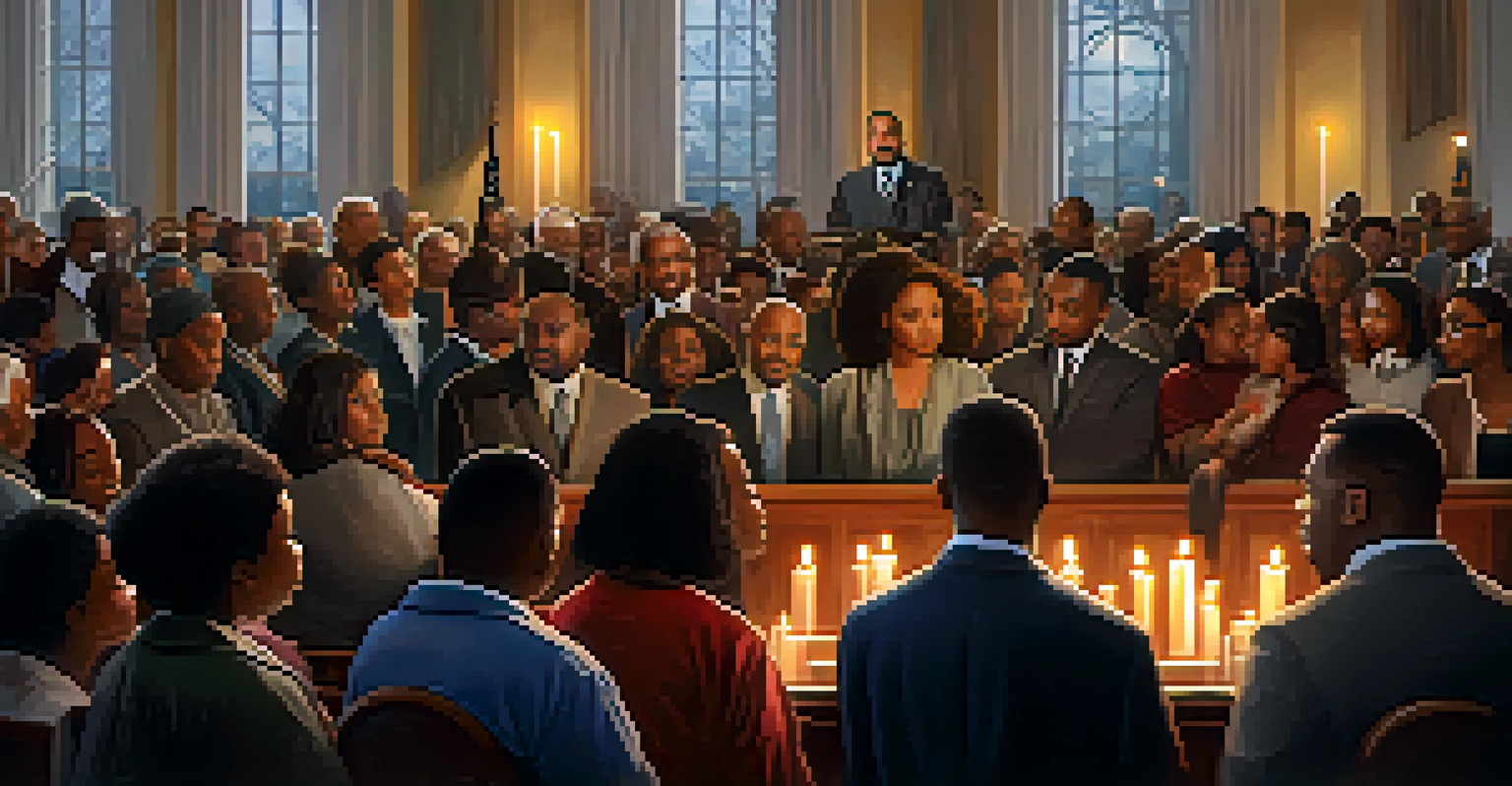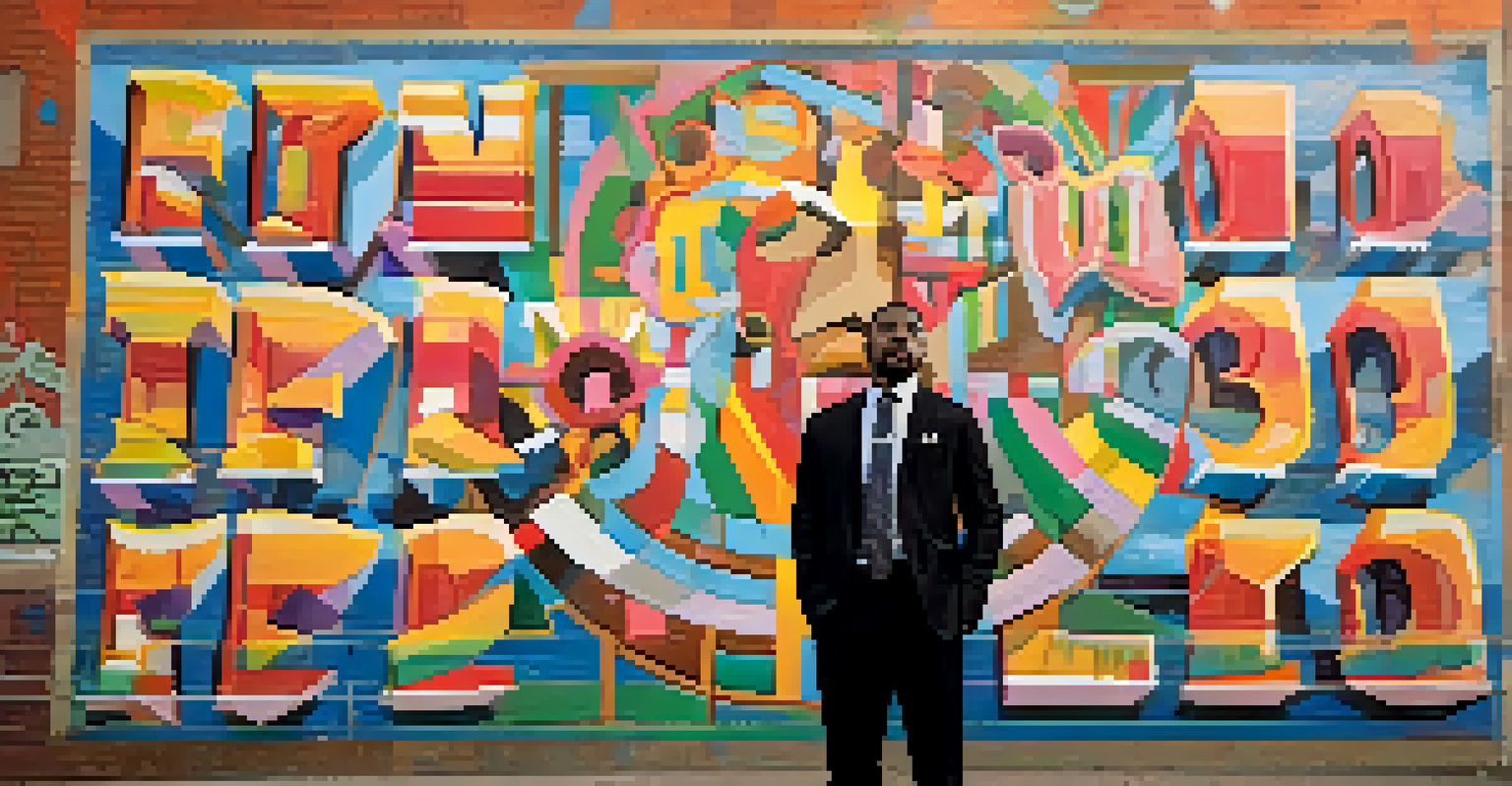Martin Luther King Jr.: Atlanta's Civil Rights Icon

Early Life: Roots in Atlanta's Rich History
Martin Luther King Jr. was born on January 15, 1929, in Atlanta, Georgia, a city steeped in civil rights history. Growing up in a middle-class family, he was influenced by strong moral values and the teachings of his father, a Baptist minister. This environment nurtured his passion for social justice and equality from a young age.
Injustice anywhere is a threat to justice everywhere.
King's experiences in Atlanta, from attending segregated schools to participating in local protests, shaped his understanding of racial inequality. The vibrant African American community in Atlanta, filled with activists and thinkers, served as a backdrop for his budding ideals. These formative years laid the foundation for his future role as a leader in the Civil Rights Movement.
His education at Morehouse College, a prestigious historically Black institution in Atlanta, further fueled his commitment to challenging the status quo. It was here that he honed his skills in public speaking and began to articulate his vision for a more just society.
Influence of Mahatma Gandhi on King's Philosophy
In his quest for social change, Martin Luther King Jr. drew heavily from the philosophy of nonviolence espoused by Mahatma Gandhi. King's encounter with Gandhi's principles during his studies in seminary inspired him to adopt nonviolent resistance as a core tenet of his activism. This approach became a hallmark of the Civil Rights Movement.

King believed that love and understanding could overcome hatred and oppression, a notion that resonated deeply with many. His commitment to nonviolence not only distinguished his methods but also helped galvanize support from diverse communities. In Atlanta, this philosophy found fertile ground as activists rallied together for justice.
King's Early Life Shaped His Activism
Growing up in Atlanta, Martin Luther King Jr. was influenced by his family's strong moral values and experiences in a segregated society, laying the groundwork for his future leadership in the Civil Rights Movement.
By promoting nonviolence, King set an example that inspired countless individuals across the United States. His ability to advocate for change without resorting to violence made a profound impact on the movement and solidified his role as a leading figure in the fight for civil rights.
The Southern Christian Leadership Conference (SCLC)
In 1957, King co-founded the Southern Christian Leadership Conference (SCLC) in Atlanta, aiming to harness the power of the Black church in the civil rights struggle. This organization played a pivotal role in organizing nonviolent protests and advocating for civil rights legislation. King's leadership in the SCLC allowed him to coordinate efforts across the South effectively.
Faith is taking the first step even when you don't see the whole staircase.
The SCLC focused on grassroots activism, empowering local communities to fight against racial injustice. It organized significant campaigns, including the Montgomery Bus Boycott and the Birmingham Campaign, which drew national attention to the struggle for civil rights. Atlanta was a central hub for many of these initiatives, reflecting the city's critical role in the movement.
Under King's guidance, the SCLC became a powerful voice for change, emphasizing the importance of collective action and unity. The organization's impact reverberated across the nation, inspiring other groups and individuals to join the fight for equality.
The March on Washington: A Defining Moment
One of the most iconic events in the Civil Rights Movement was the March on Washington for Jobs and Freedom in 1963. Martin Luther King Jr. played a crucial role in organizing this historic event, which culminated in his famous 'I Have a Dream' speech. The march attracted over 250,000 participants, demonstrating a unified demand for civil rights.
King's speech eloquently articulated the aspirations of millions who sought equality and justice. His powerful words resonated deeply, calling for an end to racism and urging for a future where individuals would be judged by their character rather than their skin color. This moment not only solidified King's status as a national leader but also marked a turning point in the fight for civil rights.
Nonviolence as a Core Principle
Inspired by Mahatma Gandhi, King adopted nonviolent resistance as a key strategy in his activism, which helped unite diverse communities in the fight for civil rights.
The March on Washington became a symbol of hope and determination, inspiring further activism across the country. It highlighted the urgency of the civil rights agenda and put pressure on lawmakers to address systemic racism and inequality.
Legacy of the Civil Rights Movement in Atlanta
The impact of Martin Luther King Jr. and the Civil Rights Movement is deeply woven into the fabric of Atlanta. After years of struggle, significant legislative changes, such as the Civil Rights Act of 1964 and the Voting Rights Act of 1965, were passed, largely due to the efforts of leaders like King. Atlanta emerged as a beacon of hope and progress in the fight for equality.
King's legacy continues to inspire new generations of activists who strive for social justice. The city honors his contributions through various memorials, including the Martin Luther King Jr. National Historical Park, which attracts visitors from around the world. This site not only commemorates his life but also serves as a reminder of the ongoing struggle for civil rights.
As Atlanta evolves, King's vision for a just and equitable society remains relevant. His teachings encourage continued dialogue about race, justice, and equality, urging communities to reflect on their progress while acknowledging the work that still lies ahead.
Commemorating King: Annual Events in Atlanta
Atlanta celebrates Martin Luther King Jr.'s legacy through various annual events that honor his contributions to civil rights. The Martin Luther King Jr. Day commemorative service is a highlight, featuring speakers, music, and reflections on his enduring impact. This event brings community members together to celebrate progress and acknowledge the ongoing fight for justice.
The city also hosts marches and educational programs that engage citizens in discussions about civil rights issues. These events foster a sense of community and encourage active participation in the pursuit of equality. By commemorating King's legacy, Atlanta reinforces its commitment to social justice.
Legacy of King's Influence Today
Martin Luther King Jr.'s teachings continue to inspire modern activists addressing various social injustices, emphasizing the ongoing relevance of his vision for equality and justice.
Through these celebrations, the spirit of King’s message lives on, inspiring individuals to take action in their own communities. Whether through volunteering, advocacy, or simply spreading awareness, the legacy of Martin Luther King Jr. continues to motivate efforts for change.
King's Enduring Influence on Modern Activism
Martin Luther King Jr.'s influence extends far beyond the Civil Rights Movement; he has become a symbol of hope and resilience for modern activists. His teachings on nonviolence and social justice resonate with those fighting against various forms of oppression today. In a world still grappling with inequality, King's legacy serves as a guiding light for many.
Activists addressing issues like racial injustice, climate change, and economic inequality often draw inspiration from King's vision of a more equitable society. His ability to mobilize communities and advocate for systemic change remains a powerful example of effective leadership. In Atlanta and beyond, his influence continues to shape the discourse around civil rights.

As contemporary movements emerge, they often invoke King's principles, reminding us that the fight for justice is ongoing. His message encourages new generations to engage in activism, fostering a sense of responsibility to uphold the values of equality and justice for all.